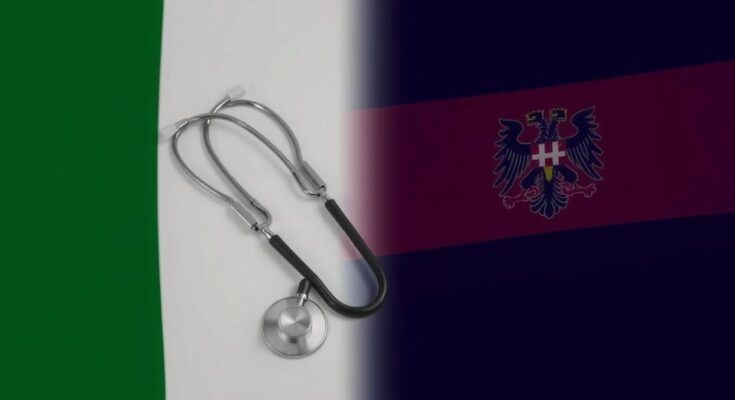A coalition of 14 NGOs has vehemently criticized the Italy-Albania deal, claiming it endangers the health and rights of asylum seekers. They argue the deal violates medical ethics, lacking necessary healthcare provisions during screenings and detentions. The organizations call for health professionals to reject complicity in these practices and advocate for a more humane treatment of vulnerable migrants.
In a fervent outcry against the controversial Italy-Albania deal concerning asylum seekers, a coalition of 14 sea rescue NGOs, including organizations like Doctors Without Borders and Mediterranea Saving Humans, have raised alarm over severe ethical violations. They argue that this agreement compromises both medical ethics and human rights by potentially endangering the health and well-being of vulnerable migrants. The NGOs contend that the treatment meted out to these migrants, often survivors of horrific traumas, is deeply inadequate and dehumanizing.
Upon rescue at sea, asylum seekers face a grueling journey that may see them subjected to several screenings aboard military vessels. This process, as outlined in a letter addressed to health professionals and stakeholders, lacks proper medical facilities needed for adequate assessments, trapping migrants in situations rife with the risk of psychological distress and even retraumatization. The screening procedures, they claim, are deficient, failing to consider the profound mental health challenges many migrants face after enduring violence, torture, and human rights abuses on their way to safety.
The letter categorically states that the inadequacies of healthcare provisions during these screenings and subsequent detainment threaten to undermine any chance of recovery from the myriad traumas experienced by migrants. These organizations emphasize that migrants, especially those classified as vulnerable—such as minors or victims of sexual violence—deserve a compassionate and comprehensive approach to care rather than a mere bureaucratic processing of their claims. They call for solidarity among medical professionals to resist complicity in what they describe as a system driven by discrimination rather than the dignity and care each individual deserves.
The critique extends to the Italian Health Ministry and associated institutions who, the NGOs argue, are perpetuating a cycle of neglect and violation of established human rights protocols. To reinforce these claims, they highlight the necessity of providing a more humane and supportive environment for all rescued migrants, suggesting that the Italian approach to migrant health and well-being needs a complete overhaul. Their appeal underscores the pressing need for a system that sees the humanity in each asylum seeker, offering not only refuge but also healing and understanding where it is desperately needed.
The Italy-Albania deal allows Italy to send asylum seekers to Albania for processing, a move that has drawn vehement criticism from various non-governmental organizations (NGOs). These organizations, actively involved in rescue operations across the Central Mediterranean route, claim that the deal violates fundamental medical ethics and human rights. The backdrop of this controversy lies in the numerous traumatic experiences faced by migrants, making them particularly vulnerable and in need of specialized care that they are unlikely to receive under the current framework. The NGOs maintain that many migrants have endured physical and psychological suffering, leading to significant concerns about their mental health. They emphasize that the conditions faced during transit and within Albanian detention facilities are critically unsafe, lacking adequate medical provisions. The dialogue is framed against a larger narrative of migration in Europe, highlighting the struggles and systemic failures that many asylum seekers continue to face. Furthermore, the NGOs are not only reacting to the current policies but also aiming to inspire broader changes in how health care professionals engage with migrant populations. They call for a shift towards empathy and accountability, challenging the existing norms that place bureaucratic efficiencies above the dignity of individual lives. In this landscape, the pressing question remains about how best to uphold and protect the rights of those seeking asylum, which the NGOs believe is being severely compromised under the current agreement.
The coalition of NGOs firmly opposes the Italy-Albania deal, citing ethical violations that put the health and well-being of vulnerable migrants at risk. Their criticism extends to the lack of adequate healthcare provisions, which fails to address the mental and physical needs of those rescued from perilous journeys. By urging solidarity among health professionals and institutions, they advocate for a humane approach that recognizes the dignity of every individual seeking asylum. This controversy not only highlights the repercussions of current migration policies but also calls for a paradigm shift in how society approaches the care and rights of asylum seekers in the future.
Original Source: www.infomigrants.net



